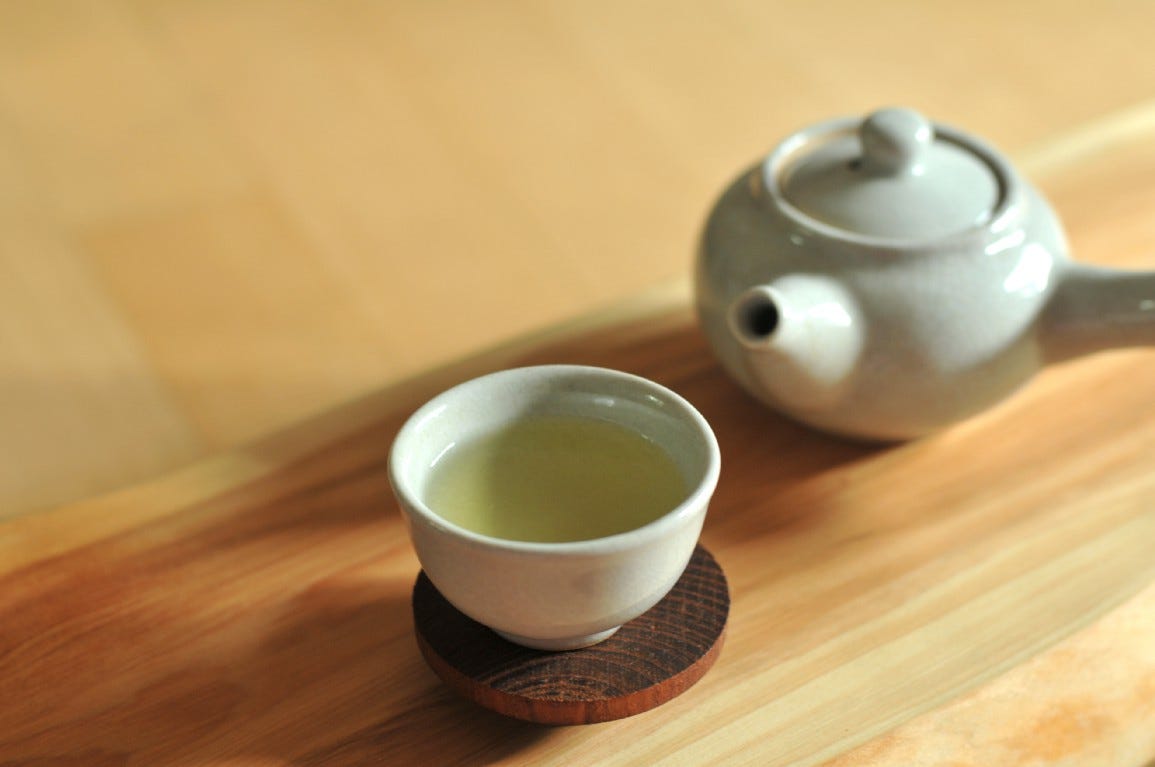Green tea is made from tea leaves that provide a greenish tint to the hot water that they’re steeped in. Many of the commonly known green tea types do contain Japanese names, such as sencha and matcha.
Some people do say that the consumption of green tea does provide health benefits, while of course others will comment that green tea doesn’t do anything beneficial at all.
But let’s see why people do consider that green tea (obtained from the leaves of the Camellia sinensis plants can be that beneficial).
We can’t deny that these plants contain useful antioxidants.
An analytical lab test will tell us that Camellia sinensis contains antioxidant polyphenols such as epigallocatechin gallate (EGCG).
We can say many nice things about EGCG, as scientific studies have indicated.
EGCG can help with acne.
EGCG can purportedly help with improving metabolism and supporting weight loss.
EGCG can scavenge heavy metal ions and promote the elimination of such stuff from our body, as well as support the cells in our body to produce more endogeneous antioxidants:
Antioxidant Protection In The Body Begins From Within The Cell.
·Our body is constantly in a tug of war between reduction and oxidation (redox), which basically comprises multiple reactions where electrons are being transferred from one component to another.
It can even help with brain health and potentially prevent dementia.
But we have to remember that these tests were done with a purified form of EGCG on hand — not by brewing Camellia sinensis leaves and asking participants to drink the tea.
In the realm of nutrition, what we’re trying to do is to feed ourselves with foods that can be beneficial to our health — we don’t realise that the entire process of digestion requires the nutrients obtained from foods digested in our stomach to actually diffuse across the intestinal membranes into our blood.
And in the case of green tea, how we boil the tea leaves can influence how much EGCG we actually do release from the cell walls.
In the realm of pharmaceuticals, what we’re trying to do is to use the purified form of specific chemicals that can bring about a desired biochemical reaction or inhibit an undesirable biochemical reaction in our body — there is an extremely high level of specificity involved.
Hence scientific experiments will deal with the results of an extract that is purified from the plant. Foodies don’t necessarily have to consider that aspect — because they’re not the ones writing up scientific research articles.
We therefore have to consider the specificity of what we’re feeding ourselves with — especially when there are so many different variables in question.
I, for one, doubt the efficacy of drinking my own brewed teas for “health” purposes — especially when I don’t know how to brew it for an optimal release of the phytonutrients.
I would, however, be more trusting in the efficacy of a purified extract that meets product manufacturing standards and is shown to be absorbed well by the human body.
And if such a product can be checked and verified for its purity and absorption, it’s more likely that it can be beneficial for health reasons. After all, can we even be sure that dietary supplements were manufactured for maximal bioavailability in the first place?
What we’d therefore see is the emergence of a product that is manufactured with a similar level of care and consideration that pharmaceutical products are treated with, while at the same time we can’t really make claims about these products being able to “cure” or “treat” any health conditions.
Which is ok — nutrition was never designed as an outright cure to any kind of health situation. We do have to be mindful of that.
And in the same way, while purified green tea extract may be helpful with certain conditions that we’re facing, we can’t really claim that drinking green tea helps us to lose weight, for instance.
After all, weight loss is not just dependent on what we put into our bodies, but also what outputs we have from our bodies. I could drink gallons of green tea daily but remain as an absolute couch potato at home — mixed sporadically with ice cream and potato chips.
There’s no way I’d lose weight like that.
And the potato chips and ice cream would be such arbitrary factors that they cannot be factored into scientific experiments — though people who do choose to go that route can, of course, make the claim that “green tea doesn’t help them to lose weight”.
Let’s be real about this.
EGCG may affect the biochemical pathways in our body and help to steady an imbalanced ship. That’s what the scientific studies have shown.
Drinking brewed green tea may not necessarily provide the same results.
But we also do have to consider other conflicting factors that can affect the results that we want to achieve, too!
Do feel free to check out the products I use that contain a highly bioavailable source of EGCG:
Disclaimer: This product link is an affiliate link. I may receive commissions for any purchases made via the link.
Also, do feel free to share this article and hit the “subscribe” button to get more updates about the science concepts in nutrition and health, all deconstructed nicely for your convenient perusal!





